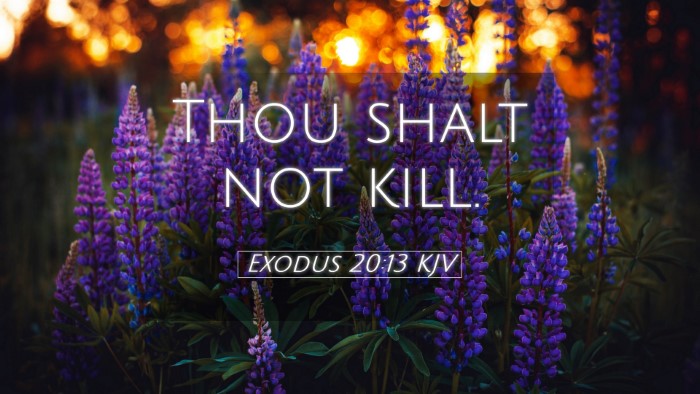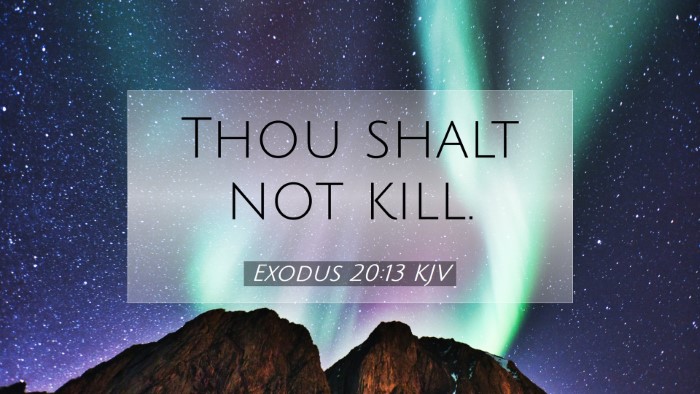Commentary on Exodus 20:13
Verse: "You shall not murder."
Exodus 20:13 stands as one of the ten commandments central to the ethical and moral framework provided by God to His people. This command is succinct yet profound in its implications for human conduct and the sanctity of life.
Historical Context
The setting of this commandment emerges from the covenant God established with Israel after their deliverance from Egypt. It serves as a foundational moral directive, not only for the nation of Israel but extending principles of justice and ethical behavior relevant for all humanity.
Insights from Commentaries
Matthew Henry
Matthew Henry emphasizes the sacredness of life, noting that this commandment underscores the value of human existence created in the image of God. He points out that "murder" refers specifically to the unlawful killing of another person, which not only encompasses the act itself but also the hatred and malice that may precede it. Henry elaborates that the command intends to foster a community of love, respect, and care for one another's lives, important for societal harmony.
Albert Barnes
Albert Barnes further delves into the understanding of "murder" as distinct from other forms of killing, such as warfare or capital punishment sanctioned by the state. He notes that the prohibition is aimed at unjust and malicious killing which betrays the very essence of human dignity. He articulates that the command serves a dual purpose: it is a moral boundary for society and also a reflection of God’s nature, who values life and seeks justice.
Adam Clarke
Adam Clarke expands on the interpretation of this commandment by discussing its implications on both personal behavior and societal laws. He points out that the Hebrew term used for "murder" implies not only the outright killing but also harm toward another individual that might lead to death. Clarke emphasizes the moral responsibility to nurture life and to actively seek the well-being of others to fulfill the spirit of this command. He notes that the commandment roots itself in the love of neighbor outlined throughout Scripture, supporting a lifestyle of compassion rather than violence.
Theological Implications
This commandment carries significant theological weight. It reflects God’s justice and mercy, as well as His expectation for His followers to uphold these attributes in their conduct. By forbidding murder, God commands His people to recognize the divine image in one another, urging them to participate in the preservation and flourishing of life.
Sanctity of Life
The doctrine of the sanctity of life is reinforced through this commandment. Life is a gift from God, and thus, the act of taking another's life without just cause represents a direct affront to God's creative authority. Pastors and theologians can utilize this understanding as a basis for discussions on abortion, euthanasia, and capital punishment, framing these issues within the broader context of respect for life.
Importance of Attitude
Moreover, Jesus later expands on the commandment in Matthew 5:21-22, indicating that even harboring anger or contempt qualifies as a breach of this divine injunction. This illustrates that God desires not only adherence to the letter of the law, but also a heart committed to love and reconciliation. Thus, the spirit of the commandment includes a call to internal purity and interpersonal harmony.
Practical Applications
For pastors and students, this commandment serves as a rallying point for teaching about the importance of relationships that embody grace and truth. Furthermore, it invites discussions around conflict resolution, the role of the church in advocating for peace, and community service initiatives that promote life affirming practices.
Community and Conflict Resolution
- Promote Peace: Encourage congregants to resolve disputes amicably and to seek forgiveness regularly.
- Value Life: Engage in social justice efforts that protect the vulnerable and uphold life at all stages.
- Educate: Teach regarding the emotional and spiritual devastation that can arise from murder, including both the loss of life and the consequences for the perpetrator.
Ethical Discernment
As students and scholars delve into the ethical ramifications of this commandment, it is crucial to approach discussions surrounding violence in media, self-defense, and criminal justice through the lens of this command's core principles. They ought to challenge societal norms that glorify violence and advocate for restorative justice approaches.
Conclusion
Exodus 20:13 encapsulates God's call to preserve and honor life, shedding light on personal and communal responsibilities. This commandment serves as a lighthouse for mankind, guiding believers toward a life marked by compassion, respect, and love for others, reflecting God's nature in their interactions.


